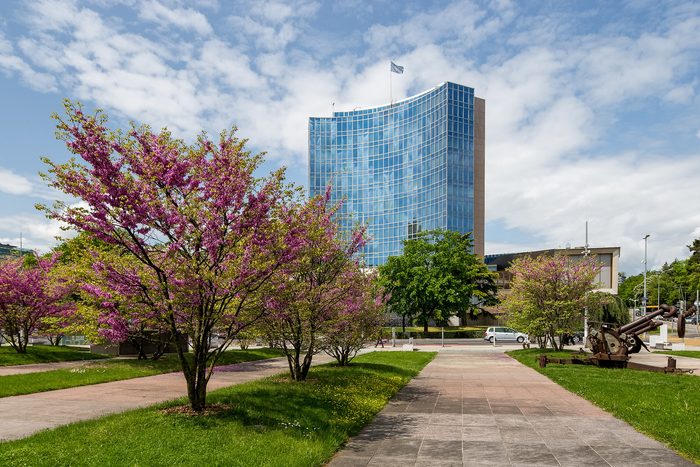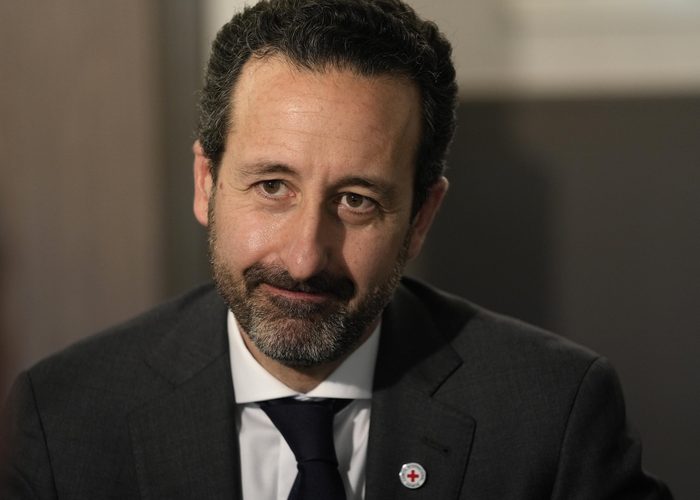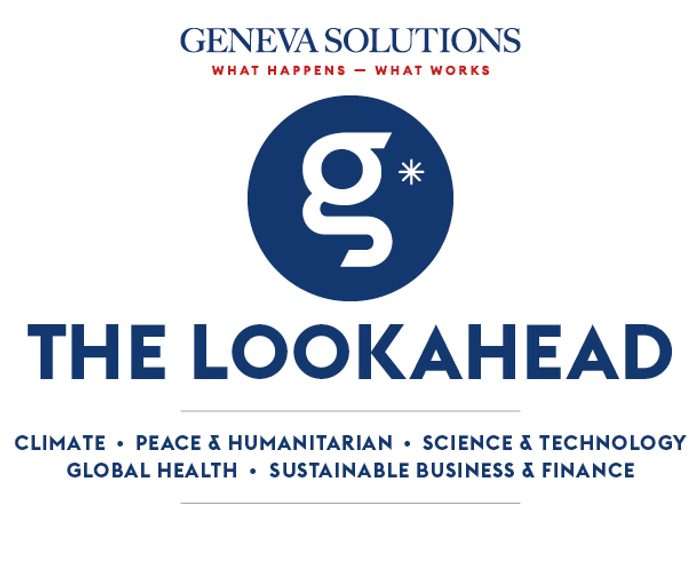Good morning, this is Kasmira. Multilateral agreements are rare events these days. Trade negotiators in February saw eye-to-eye long enough to agree to an extension to the e-commerce moratorium, but the second phase of a fisheries subsidies deal was left floundering.
At the World Health Organization headquarters, efforts to draw up the world’s first pandemic treaty will limp into extra time next week. Environmental treaties have shown more promise of late, with countries setting their sights this week on plastic pollution at talks in the Canadian city of Ottawa.
Meanwhile, in Geneva, in the sleek corporate-feel sanctum of the World Intellectual Property Organization, a new agreement is taking shape, spurred on by developing countries, which could help set an example for how to get things done in a flailing multilateral environment. |

|

View of WIPO's main building from the Place des Nations. Over 1,000 delegates will attend talks on genetic resources and associated traditional knowledge from 13-24 May.(WIPO/Emmanuel Berrod)
|
|
A new multilateral treaty takes root at WIPO to recognise traditional knowledge.
In the tropical forests of the Amazon basin, a small unassuming tree with dark green leaves and green fruit has been used by generations of Indigenous Amazonian peoples for its special medicinal powers. Its bark and branches are broken up and mixed with Brazilian sugarcane liquor to create a “nerve tonic” that’s used to treat illnesses, from depression to anxiety to strokes or even sexual impotence.
Known by many names, including mirantã, this genetic resource has made its way into many patented products on the market today, many with striking resemblances in their uses to traditional peoples’ medicine. There are even enough links to suggest this knowledge may have been drawn on to create some of these not-so-new inventions, a study by Brazilian academics, published by Geneva-based NGO South Centre, has shown.
“There is a kind of appropriation (in the intellectual property system), and it is subtle and difficult to detect, but it’s there,” Marcos Vinício Chein Feres, a law professor at the Federal University of Juiz de Fora in Brazil and author of the study, told Geneva Solutions.
His concerns are not new to the intellectual property industry. For the last 25 years, members of the World Intellectual Property Organization (WIPO), led by developing countries, have been pushing for more transparency and recognition of traditional knowledge and cultural expressions that are linked to the use of genetic resources.
Those discussions are finally edging closer to the finish line. Around 1,200 negotiators, lawyers, Indigenous representatives and civil society groups will gather at the UN body’s headquarters in Geneva from 13 to 23 May to finalise the so-called instrument on intellectual property, genetic resources and associated traditional knowledge.
Read the full story on Geneva Solutions
|
|
|
🌳FALSE SOLUTION?
Carbon markets have been touted as a crucial tool to mitigate climate change by helping countries and firms bring down their emissions. Indigenous campaigners are challenging that notion and want them gone.
|
|
Carbon screen.
The US-based Indigenous Environmental Network told a UN Indigenous forum gathering until today in New York that not only are the credits ineffective, but they also exploit and divide their communities, the media outlet Grist reported. The NGO says they pose issues with land tenure and the right to free, prior and informed consultation. Plus, they see it as a smokescreen used by the fossil fuel industry to keep polluting.
📖Read our past coverage: Carbon markets require rights focus, say NGOs at Cop28
|
|
Road to Baku.
Talks to formulate rules for carbon trading have stumbled climate summit after climate summit. The upcoming Cop29 in Azerbaijan is expected to finally deliver an agreement to set up a centralised scheme that would allow countries to write off their emissions by supporting green projects elsewhere. The Indigenous network wants the forum to call for a moratorium at the UN conference before the tool is formalised.
|
|
|
💉A SHOT AT LIFE.
The world has one tool at its disposal to effectively fight disease, and that is vaccines. According to a study led by the World Health Organization and released on the occasion of Immunization Week, jabs have saved 154 million people, mostly children under five, in half a century.
|
|
Top marks.
The measles vaccine scores highest, accounting for 60 per cent of lives saved.
|
|
Setbacks.
Conflict, climate change, migration, environmental wreckage and other factors are driving disease outbreaks as fundraising efforts for health struggle.
|
|
Case in point.
An upsurge in cholera cases in several countries led in January to a total depletion of the global emergency stockpile. It was brought back up to 2.3 million doses last month but is still far below the five million target, WHO’s cholera lead Phillippe Barbosa told reporters in Geneva on Tuesday.
But between limited funding and climate change driving the disease, the situation is bound to get worse, he added. “Cholera thrives in environments with inadequate sanitation and clean water. Unfortunately, the current climate crisis with frequent droughts and floods in countries in Eastern and Central Africa is creating the perfect storm for cholera outbreaks to thrive.”
|
|
Slight good news.
The WHO recently approved a widely used version of the cholera vaccine that is simpler, cheaper and faster to produce. That should help ramp up production to 50 million doses this year, Barbosa said, though still short of the 79 million requested by countries so far not counting the many more other countries in west Africa, the Middle East and the Caribbean will need later this year as they enter their outbreak season.
|
|
Here's what else is happening
|
|
International Geneva moves
|
|

Robert Mardini during an interview with The Associated Press, in Dubai, United Arab Emirates, 14 March, 2022. (Keystone/AP Photo/Kamran Jebreili)
|
|
From red cross to white coat.
Robert Mardini, former director general of the International Committee of the Red Cross, has been appointed to head the Geneva University Hospitals, HUG, after the state council approved his nomination on Wednesday. Mardini will take over the role as of September 2024. He led the ICRC from 2020 to 2024 before stepping down to be replaced by former UNRWA head Pierre Krahenbühl.
Keystone-ATS (FR)
|
|
|
GS news is a new media project covering the world of international cooperation and development. Don’t hesitate to forward our newsletter!
Have a good day!
|

|
|
Avenue du Bouchet 2
1209 Genève
Suisse
|
|
|
|









